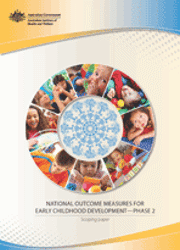Summary
This report constitutes Phase 2 of the National Outcome Measures for Early Childhood Development project. Developing an indicator-based reporting framework for early childhood development will enable monitoring of achievements against the Early Childhood Development Outcomes Framework outlined in the National Early Childhood Development Strategy, Investing in the early years (the ECD Strategy), released by the Council of Australian Governments (COAG) in July 2009.
The ECD Strategy is designed to guide Australia's comprehensive response to evidence about the importance of early childhood development, and the benefits-and cost- effectiveness-of ensuring that all children experience a positive early childhood from before birth through the first 8 years of life.
Phase 1 of the National Outcome Measures for Early Childhood Development project recommended 20 indicator topic areas for reporting against the Early Childhood Development Outcomes Framework included in the ECD Strategy. Indicators with data sources were recommended for 13 of the 20 topic areas. This work was published in the report National outcome measures for early childhood development: development of an indicator- based reporting framework (AIHW 2011b).
The main focus of Phase 2 was to review potential indicators and/or data sources for the remaining 7 topic areas that required additional work at the end of Phase 1. Five topic areas required indicator development (child behavioural problems, peer relationships, cultural appropriateness, school engagement and parenting quality/capacity) and 2 topic areas required investigation of potential data sources (social and emotional wellbeing, and family social networks).
Forty potential indicators have been put forward in this report as being conceptually suitable across the 5 topic areas that required indicator development. There are 8 indicators with available data sources across 4 of the 5 topic areas. However, for the 'school engagement' topic area, none of the indicators discussed have an available data source.
Further consideration should be given as to whether the 8 indicators with available data are the most appropriate for the constructs measured, whether options should be explored for incorporating identified indicators with no available data source into existing surveys, or whether a new national early child development survey should be established to collect the necessary data for reporting against the Early Childhood Development Outcomes Framework.
For the 2 topic areas requiring investigation of data availability-'social and emotional wellbeing' and 'family social networks'-suitable data should become available during 2015.



